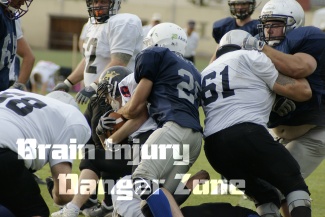Tackle Football and Brain Injury
Dr. L. Robbins of the Robbins Headache Clinic recently posted some thoughts about (American) Football and the injuries that can lead to headache conditions. Here is a portion of what he wrote:
 |
Concussions are part of football, with the severity ranging from mild (feeling dazed) to severe (out cold). … Some symptoms may linger for years. Players with multiple concussions have an increased chance of long-term problems that include chronic headache, lower GPAs, memory and emotional difficulties, dementia, and a host of other problems.
Equally disturbing are repeated knocks to the head that do not produce obvious concussion symptoms. A child who plays football from ages 7-18 will typically sustain thousands of hits to the head during games and practices over the years. High school players occasionally die from football. This may occur due to “second impact syndrome,” from returning too soon after the first concussion. Chronic traumatic encephalopathy (CTE) can result from many head impacts, and leads to death among NFL players and boxers. It recently has been identified in high school and college age players.
So what does Dr. Robbins recommend? Should we ban football?
Recognizing the difficulties, he makes some suggestions, such as:
- Eliminating tackle football for those under 18.
- Eliminating hitting in practice. As strange as this may sound to some, it was a policy used by John Gagliardi, arguably the most successful coach in the history of American football.
- Use certified trainers.
- Improved helmets, although Dr. Robbins admits these help only slightly when it comes to concussions. (Remember the Riddell helmet controversy?)
- Educate players, coaches and parents about proper tackling techniques, keeping heads up, and reporting concussions.
- A buddy system to help players report concussions.
- Laws regarding concussions may help, but brain damage can occur even without concussions.
Regarding the concern about concussions, here’s the issue. A concussion is actually a MTBI – that is, a mild traumatic brain injury. Players should not go back in the game after a mild brain injury (that is, a concussion). Which means players often will not want to report a concussion. Which can cause very serious problems, especially if they get hit again. Post concussion syndrome – and worse.
That’s why there’s so much obsession over what many people still think of as an insignificant issue.
Obviously this issue goes beyond tackle football. Similar injuries can occur in football/soccer, basketball, as well as the more obvious sports such as rugby and boxing.
Thanks to Dr. Robbins for continuing the discussion. Read more about head trauma in sports here.
